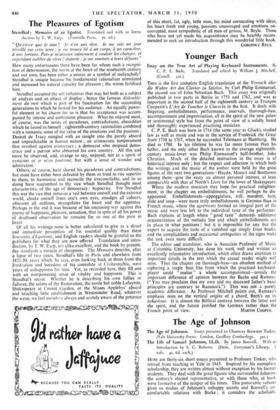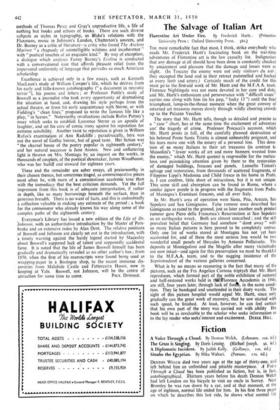The Age of Johnson m
HERE are thirty-six short essays presented to Professor Tinker, who retired from teaching at Yale in 1945. Inspired by his exemplary
scholarship, they are written almost without exception by his former
students. They deal with the great figures who surrounded Johnson,
the century's elected representative, or with those who, at least, were formative of the temper of his times. This panoramic volume
gives us studies of Johnson's unhappy secrets and Boswell's un-
comfortable relations with Burke ; it considers the scholastic
methods of Thomas Percy and Gray's unproductive life, a life of nothing but books and echoes of books. There are such diverse subjects as styles in typography, as Blake's relations with the Flaxmans, music in Johnson's London, Chatterton's sources, and Dr. Burney as a critic of literature—a critic who found The Ancient Mariner " a rhapsody of unintelligible wildness and incoherence " with " poetical touches of an exquisite kind." By way of exception, a dialogue which analyses Fanny Burney's Evelina is conducted with a conversational ease that affords pleasant relief from the impersonal uniformity of language that pervades so much American scholarship.
Excellence is achieved only in a few essays, such as Kenneth MacLean's study of William Cowper's life, which he derives from his early and little-known autobiography (" a document in neurotic terror "), his poems and letters ; or Professor Pottle's study of Boswell as a journalist who took every opportunity of dramatising the situation at hand, and, drawing his style perhaps from the actual theatre, or from his early acquaintance with Sterne, or with Fielding's " clean lines," proposed to write the famous life like a play, " in Scenes." Noteworthy revaluations include Rufus Putney's essay which seeks to establish Laurence Sterne as an apostle of laughter, and set his core of comic irony against his reputation for extreme sensibility. Another twist to reputation is given in William Rufus's examination of Ann Radcliffe ; paradoxically, hers was not the novel of Gothic horror, but of good taste. Her fiction was " the charnel house of the poetry popular in eighteenth century," and her natural successor is Jane Austen. New and unflattering light is thrown on Mrs. Montagu by an inquest on the works, in thousands of couplets, of the poetical shoemaker, James Woodhouse, who was her bailiff and steward for eighteen years.
These and the remainder are sober essays, all praiseworthy in their chosen themes, but sometimes tinged, as commemorative pieces must often be, with more of a conscientious academic tone than with the immediacy that the best criticism demands. Yet the full impression from this book is of adequate interpretation, if rather in depth, like so many burrowings beneath the surface, than in generous breadth. There is no want of facts, and this is undoubtedly a collection valuable in making any estimate of the period ; a book for the connoisseur who already knows his way along some of the complex paths of the eighteenth century.
Everyman's Library has issued a new edition of the Life of Dr. Johnson, with an authoritative introduction by the Master of Pem- broke and an extensive index by Alan Dent. The relative positions of Boswell and Johnson are clearly set out in the introduction, with a timely warning against the 'hardy legend started by Macaulay about Boswell's supposed lack of talent and supposedly accidental fame. It is noted that the life of James Boswell himself has been gradually and dramatically revealed as no other author's has ; from 1850, when the first of his manuscripts were found being used as wrapping-paper in a Boulogne shop, to the recent immense dis- coveries from Malahide Castle and Fettercairn House, now in keeping at Yale. Boswell, not Johnson, will be the centre of







































 Previous page
Previous page